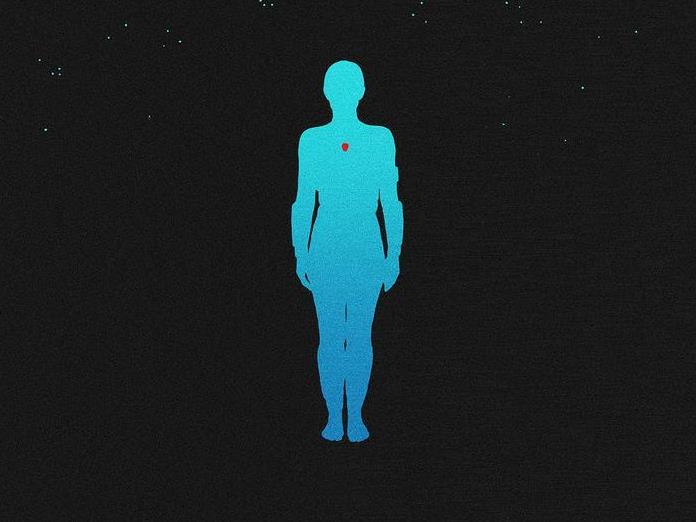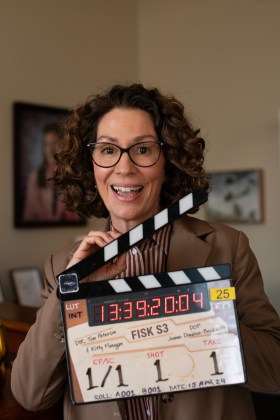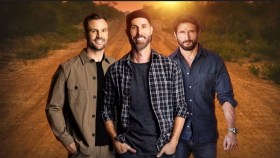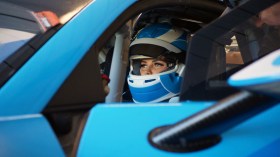A festival full of intimate moments – between humans and robots and aliens. Image: Part of a poster for Andromeda, a short film directed by Emily Limyun Dean.
In a calendar that’s chock full of film festivals celebrating every cultural niche on the planet, the SciFi Film Festival (18-21 October, Event Cinemas, George St) remains one of the little ones. It’s thus far confined to Sydney, with a boutique selection of nine feature films and 16 shorts.
We think of ScFi as tentpole films, full of spaceships, flying superheroes and futuristic landscapes. Indeed, the festival features the Australian documentary My Saga, where filmmaker Adam Harris takes his young son to a Star Wars convention in the US as a way of dealing with a cancer diagnosis. if you need one trailer to tell you the importance of mass culture fandom, this is it. The idea is very moving.
Ironically, according to SciFi Film Festival program director Simon Foster, those blockbuster films run away from the label. ‘It depends on your definition,’ he says on the phone to Screenhub.
The future of giants?
‘You could call the Marvel films and the Star Wars films a kind of Sci Fi, and they dominate the box office worldwide, but the marketing around those films goes out of its way to label them as fantasy or comic book films because there’s still something of a B-movie mentality for most people around the term. Also, anything that’s slightly challenging is still a hard sell and considered niche.’
Foster admits Star Wars was a massive influence on his own childhood, along with Close Encounters of the Third Kind, Battlestar Galactica and more rarefied fare like Solaris and Alphaville. That breadth of taste informs the festival.
An example of this is the gorgeous-looking Andromeda (pictured above), a short film directed by Australian storyboard artist turned director and producer Emily Limyun Dean, about a future where androids are the new working class and one of them will be gifted a real heart through the love of a child. Born in the US, raised in Bungendore, trained at Sydney University in Australian and Chinese history, now working Los Angeles, Dean is determined, with an eye for a poignant idea.
Her website documents her work carefully from concept art to production. Although she worked on the upcoming The LEGO® Movie 2: The Second Part, these small films might give her more of a future than the tentpoles.
‘The era of the big sweeping blockbuster might have passed us by,’ says Foster. ‘There might be this perception that because of new technology everyone can make a big rip-roaring space adventure on their laptop, and that may be the case, but it’s certainly not what we’re seeing in the films turning up this year.’
What’s going on with Australian Sci Fi?
Foster says the six Australian films he’s programmed this year demonstrate the breadth and variety of Australian sci-fi, and also our ability to create amazing visions on very low budgets.
There are two features: the previously mentioned simple first-person documentary My Saga (Adam Harris); and the astonishing and challenging Reflections in the Dust (made by the 23-year-old Luke Sullivan).
Direct from its premiere at Karlovy Vary Film Festival, where it both shocked and impressed, Reflections in the Dust blends factual interviews with a post-apocalyptic tale set on the edge of a swamp, where a blind girl and her father (a paranoid schizophrenic clown) eke out a living. The film stars Robin Royce Queere and Sarah Houbolt, who is blind and suffers from the rare Hallermann-Streiff syndrome. You can get an idea of the film’s style here:
Foster says a film like Reflections in the Dust demonstrates the broad scope of sci-fi. ‘It’s an amazing work of the imagination. Some critics have called it very European and likened it to Tarkovsky in the way it tells its science fiction story. It’s not overtly a sci-fi film. Clearly society has collapsed and there’s a dystopian element to the storytelling. A lot of it is framed in tight closeups and there’s an otherworldly feel to it. I decided to give it a go because it’s interesting and it can be interpreted in many ways.’
Foster points to a short film like Thalamos as an example of how ‘there’s a great deal of ingenuity in locally made sci-fi. ‘This is put together by two Melbourne boys on next to no budget, but it looks like a real big budget film. It shows we can make sci-fi off our own back as well as any country in the world.’
The realities of running a festival
It’s Foster’s first year in the role of Program Director and he says he’s been surprised at how much work has been involved in choosing and sourcing the films over the last eleven months. A freelance journalist and film reviewer, he also spent time working in sales and marketing for Village Roadshow, Columbia Tri-Star Films and 20th Century Fox ‘during the VHS boom years’, as well as being Asia Pacific Sales Manager for Variety at one point. He says the skills learnt in those jobs helped in negotiating with sales agents who were sometimes asking ‘exorbitant sums for a film to screen at a little festival like ours down under.’
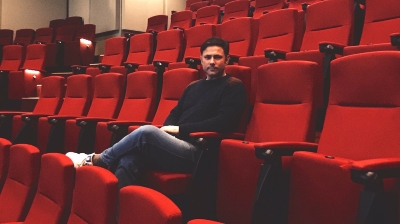
Image: Simon Foster, Program Director of SciFi Film Festival.
The SciFi Film Festival was created five years ago by Tom Papas, whose other initiatives include the 48 Hour Film Project, Screen My Shorts Inc, and Project Homeless. Papas, who remains as Festival Director, brought Foster in this year as Program Director with the specific brief of selecting all the films, and of bringing in both more commercial and more critically acclaimed work. Foster says he did this by ‘keeping track of the key movers and shakers in the sector, looking at Boston Sci Fi Festival, London, Sitges, Sundance and Rotterdam, and tracking what was working for them in terms of audiences and critics and hopefully bringing them home.’
It’s a tasty-looking and adventurous program with 18 of the 25 films being Australian premieres. There are films from Australia, the UK, US, Germany, Canada, Hong Kong, France, The Netherlands, Lebanon, Austria and the Dominican Republic. Four of the films are directed by women, and there’s a special closing night 30th anniversary screening of nuclear-paranoia classic Miracle Mile (Steve de Jarnatt).
Foster is particularly proud of the opening night film, the Australian premiere of ‘constructivist’ filmmaker Johann Lurf’s ★ (yes, the title of the film is a ‘star’ sign, and there should be a special place in hell for filmmakers who do this to journalists who are trying to write about their films!). The winner of the Diagonale Innovative Cinema Award in Austria earlier this year, ★ is compiled of starscapes from over 550 films, from the silent era to 2018, and Foster says it is unlike any other film that’s been seen in Australia. ‘I saw it in Rotterdam in February and as soon as I saw it I knew it would be our opener. I couldn’t think of a better film to open with than one that celebrates 100 years of science fiction cinema.’
The most commercial of the films on show, according to Foster, is probably the US conspiracy-theory thriller UFO. ‘That’s a film that carries the celebrity power of Gillian Anderson, returning to the alien conspiracy fold on the 25th anniversary of the X Files,’ he says. ‘I programmed it for 6.30pm on a Friday night because it’s going to be a crowdpleaser. It’s not the absolute best film of the festival, but it is going to be the only time the film can be seen on the big screen. After watching that, people can watch Canaries, a really funny Welsh comedy about an alien invasion, that has a Shaun of the Dead feel to it.’
Tackling Toxic Masculinity
Sci Fi has always been a genre that allows us to refract and consider the issues of our current day, and If there’s a recurrent theme to many of this year’s SciFi Festival films, Foster thinks it has something to do with men’s bad behaviour. He says:
‘Emily Limyun Dean’s beautifully shot dramatic-thriller Andromeda, with Aaron Glenane bringing some real menace as the narrative’s antagonist, is one several films in the festival that addresses toxic masculinity and the dismantling of patriarchal dominance. Chris Caldwell and Zeek Earl’s Prospect pits the brilliant Sophie Thatcher against not one but two flawed father figures; Luke Sullivan’s Reflections in the Dust is a brutal study of bullying and male domination. The short film The Shipment is a breathtaking deep space adventure about a father and daughter struggling to reconnect; the French short Those Who Can Die is set against a dystopian enclave steeped in the exploitation of young women. These films signify one of the genre’s great strengths – the willingness of the filmmakers to tackle contemporaries issues within fantastical narratives.’
In keeping with this theme, one of the festival’s special events involves Foster’s wife, Fiona Williams, editor of SBS Movies and host of the ‘Eyes on Gilead’ Handmaid’s Tale podcast, conducting a Q&A after the screening of Reflections in the Dust. The connection between cultural moment of The Handmaid’s Tale and its dystopic story of female subjection, and the Sci Fi Film Festival is an interesting one.
Passion projects and the nature of work in the arts
The SciFi Film Festival is a non for profit festival, run on a voluntary basis, with some generous donations. Foster’s work there as Program Director is paid in kudos and free films. Here at Screenhub we’re always interested in knowing how people really manage to live and work within the Arts. How do they survive? And to Foster’s credit, he’s completely open. He works as a freelance film writer, but he also works in retail. ‘I thank the good people at PETstock for allowing me to lug bags of dog food around the shop a few days a week to maintain my life as a glamorous film festival director,’ he says with a laugh. ‘They’re great people and sometimes it’s good to be away from the madness of this film industry.’
And in a lovely and rare moment of husbandly acknowledgement, Foster adds: ‘I can’t talk about any of this without mentioning the extraordinary generosity and understanding of my wife to allow me to do all of this, and to help fund it. I’m certainly making a lot less money than I was six years ago, but I’m happier than ever.’
The SciFi Film Festival runs 18 – 21 October at Event Cinemas George Street Complex. For more details, visit: http://scififilmfestival.com/
